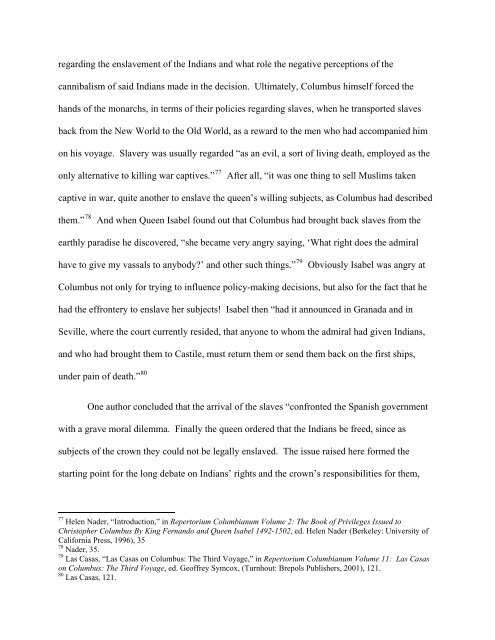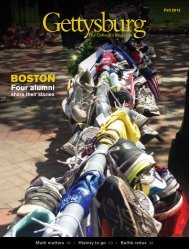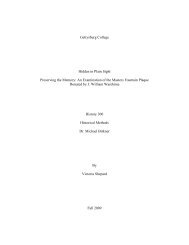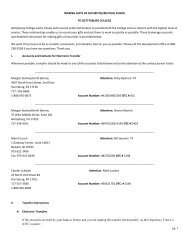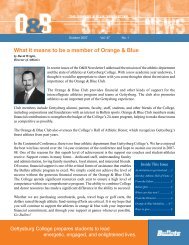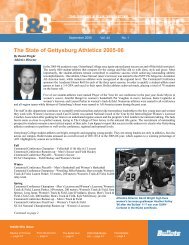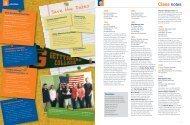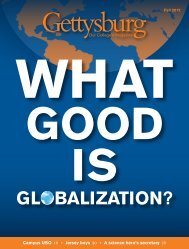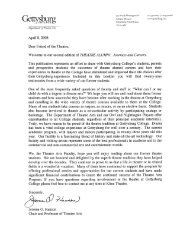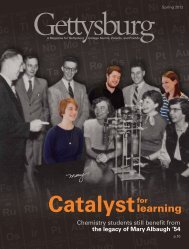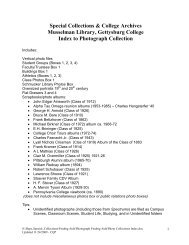Sweet Tooth for Empire: Sugar and the British Atlantic World
Sweet Tooth for Empire: Sugar and the British Atlantic World
Sweet Tooth for Empire: Sugar and the British Atlantic World
You also want an ePaper? Increase the reach of your titles
YUMPU automatically turns print PDFs into web optimized ePapers that Google loves.
egarding <strong>the</strong> enslavement of <strong>the</strong> Indians <strong>and</strong> what role <strong>the</strong> negative perceptions of <strong>the</strong><br />
cannibalism of said Indians made in <strong>the</strong> decision. Ultimately, Columbus himself <strong>for</strong>ced <strong>the</strong><br />
h<strong>and</strong>s of <strong>the</strong> monarchs, in terms of <strong>the</strong>ir policies regarding slaves, when he transported slaves<br />
back from <strong>the</strong> New <strong>World</strong> to <strong>the</strong> Old <strong>World</strong>, as a reward to <strong>the</strong> men who had accompanied him<br />
on his voyage. Slavery was usually regarded “as an evil, a sort of living death, employed as <strong>the</strong><br />
only alternative to killing war captives.” 77 After all, “it was one thing to sell Muslims taken<br />
captive in war, quite ano<strong>the</strong>r to enslave <strong>the</strong> queen’s willing subjects, as Columbus had described<br />
<strong>the</strong>m.” 78 And when Queen Isabel found out that Columbus had brought back slaves from <strong>the</strong><br />
earthly paradise he discovered, “she became very angry saying, ‘What right does <strong>the</strong> admiral<br />
have to give my vassals to anybody?’ <strong>and</strong> o<strong>the</strong>r such things.” 79 Obviously Isabel was angry at<br />
Columbus not only <strong>for</strong> trying to influence policy-making decisions, but also <strong>for</strong> <strong>the</strong> fact that he<br />
had <strong>the</strong> effrontery to enslave her subjects! Isabel <strong>the</strong>n “had it announced in Granada <strong>and</strong> in<br />
Seville, where <strong>the</strong> court currently resided, that anyone to whom <strong>the</strong> admiral had given Indians,<br />
<strong>and</strong> who had brought <strong>the</strong>m to Castile, must return <strong>the</strong>m or send <strong>the</strong>m back on <strong>the</strong> first ships,<br />
under pain of death.” 80<br />
One author concluded that <strong>the</strong> arrival of <strong>the</strong> slaves “confronted <strong>the</strong> Spanish government<br />
with a grave moral dilemma. Finally <strong>the</strong> queen ordered that <strong>the</strong> Indians be freed, since as<br />
subjects of <strong>the</strong> crown <strong>the</strong>y could not be legally enslaved. The issue raised here <strong>for</strong>med <strong>the</strong><br />
starting point <strong>for</strong> <strong>the</strong> long debate on Indians’ rights <strong>and</strong> <strong>the</strong> crown’s responsibilities <strong>for</strong> <strong>the</strong>m,<br />
77 Helen Nader, “Introduction,” in Repertorium Columbianum Volume 2: The Book of Privileges Issued to<br />
Christopher Columbus By King Fern<strong>and</strong>o <strong>and</strong> Queen Isabel 1492-1502, ed. Helen Nader (Berkeley: University of<br />
Cali<strong>for</strong>nia Press, 1996), 35<br />
78 Nader, 35.<br />
79 Las Casas, “Las Casas on Columbus: The Third Voyage,” in Repertorium Columbianum Volume 11: Las Casas<br />
on Columbus: The Third Voyage, ed. Geoffrey Symcox, (Turnhout: Brepols Publishers, 2001), 121.<br />
80 Las Casas, 121.


